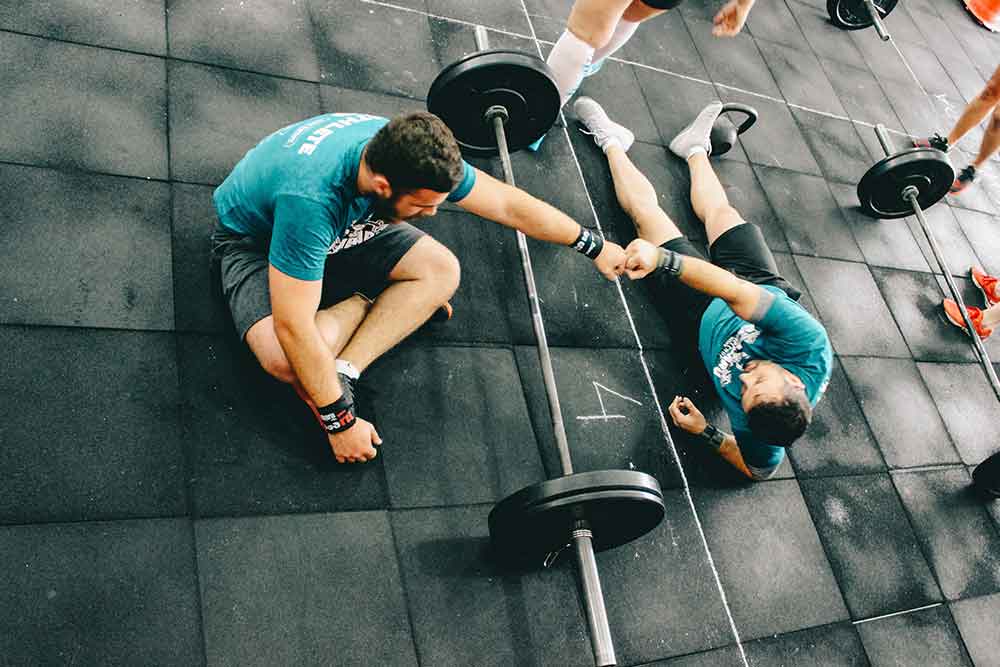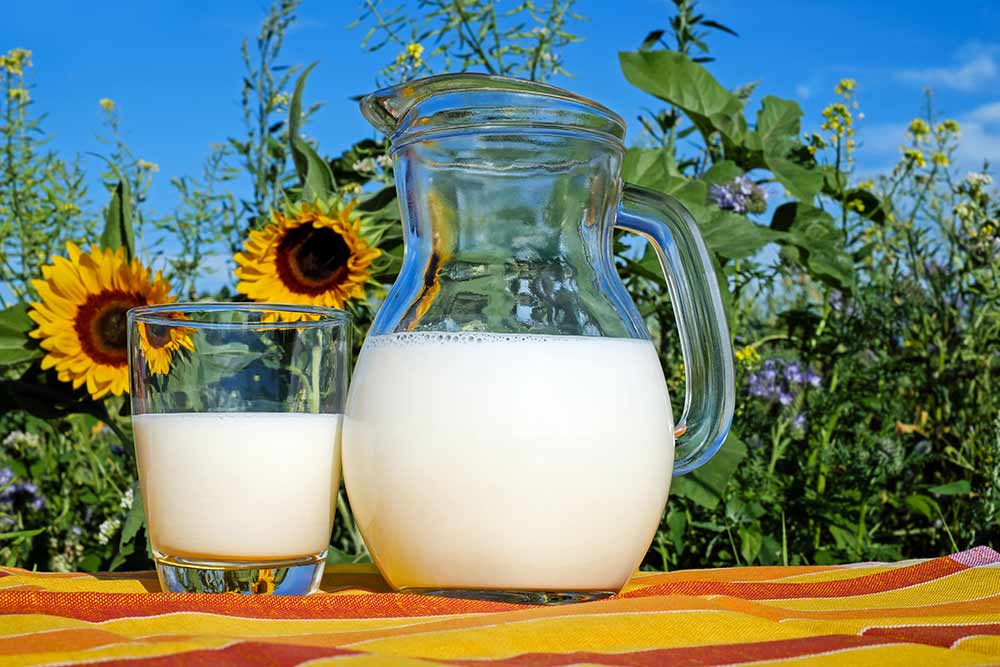Is Milk Beneficial for Exercise Recovery?

The animal source proteins such as milk, containing 80% casein and 20% whey, are considered as high-quality sources. Milk proteins result in greater muscle protein synthesis (MPS) and greater hypertrophy compared to soy proteins as they are absorbed by the intestine at a faster rate (Phillips, & Van Loon, 2011). Protein consumed post-exercise also can potentially reduce exercise-induced through lowering creatine kinase, an enzyme involved in this process. The more essential amino acids found in the protein source relates to greater stimulation of MPS; leucine being one amino acid that is important for protein synthesis, found in whey protein (Reid, 2016).
Related Article: Protein Quality Dictates Recovery, Not Timing
Recovery In Athletes
There have recently been multiple studies published in the literature regarding milk consumption and its effects on recovery in athletes.
As we know the importance to consume carbohydrates (CHO) and protein (PRO) post-exercise, milk has been proven to be an effective choice of drink. This nutrient-dense food contains CHO, PRO, and electrolytes. The casein and whey found in milk are absorbed and digested slowly which is important for the recovery period to keep blood amino acid concentrations elevated that allows for longer muscle anabolism.
The Study
 A study investigated the effects that skimmed milk as a recovery drink had on appetite and energy intake in recreationally-active females participating in moderate intense cycling (Rumbold et al, 2015). This study mentioned another factor that females consider in certain sport training; weight loss or appetite-suppressing. It was concluded that milk is a great satiating drink that resulted in a reduction in subsequent energy intakes in female athletes.
A study investigated the effects that skimmed milk as a recovery drink had on appetite and energy intake in recreationally-active females participating in moderate intense cycling (Rumbold et al, 2015). This study mentioned another factor that females consider in certain sport training; weight loss or appetite-suppressing. It was concluded that milk is a great satiating drink that resulted in a reduction in subsequent energy intakes in female athletes.
One factor causing this satiety is the amount of protein present in milk, which creates higher levels of cholecystokinin (CCK) and glucagon-like peptide-1 (GLP)-1 (Rumbold et al, 2015). Two other sources found in milk that promote satiety are lactose and calcium. Calcium stimulates postprandial circulating glucose-dependent insulinotropic peptide (GIP) as well as insulin and GLP-1. As these three processes are stimulated, they also play a role in suppressed appetite. The study suggests that milk is a great recovery drink and reduces acute energy intake in female exercisers, which can be valuable results for elite athletes who are involved in weight centered sports (i.e., gymnasts) (Rumbold et al, 2015).
Related Article: How Much Protein Do Women Really Need?
Essential Nutrients For Athletes
Milk contains essential nutrients for the athlete, having high electrolytes and sodium levels which are comparable to sports drinks. This study mentioned that the athletes could maintain their weight throughout the cycle with the milk beverages compared to the sports drink and could easily meet his energy intake, fat, PRO, CHO. Preferably, the athlete chose milk –based shakes compared to commercial nutritional supplements (Reid, 2016).
When comparing the difference between fat-free milk and isoenergetic carbohydrate drink post resistance training exercise, the fat-free milk was related to greater lean mass gains and greater loss of fat mass. The carbohydrate drink was associated with lean mass gains as well, but no loss of fat mass, indicating that milk has a positive effect on body composition in female athletes (Josse & Phillips, 2012).
The study stated that the effects of milk are very similar when looking at male and female athletes, however to obtain long-term mass gains in women athletes, it is important to consume a sufficient quantity of milk (20g post-exercise) for optimal results. Further long-term studies is required to promote and increase protein sources in young females’ diets, as milk consumption is not only important for recovery, but for bone health as well (Josse & Phillips, 2012).
Related Article: Chocolate Milk at the End of Practice
When athletes are choosing a type of post-exercise drink or supplement to consume, it is important to consider what their requirements are; quick and fast recovery, carbohydrate content included in protein drink, lactase and electrolytes, etc. Further research is needed in this area to determine the effects on different populations; this study only studied young trained men.
Conclusion
Milk consumption supplementation appears to have positive effects on the recovery rates in athletes. Further research needs to be done in this area to understand more of the direct and secondary effects that occur in the body post-exercise regarding the milk consumption. Although there is noteworthy evidence supporting this, perhaps more research would be required as to how milk consumption could be effective for specific training sessions/sports. This would benefit the athletes in the recovery stages and perhaps improve their performance.
In conclusion, consuming whole milk post-exercise is an effective method for recovery in male and female athletes as it stimulates MPS. It is also a great source of protein, carbohydrates and electrolytes as well as essential nutrients (i.e. Vitamin D and Calcium) and healthy fatty acid which may also have anti-inflammatory actions (Da Silva & Rudkowska, 2015).
Related Article: Fat, Carbs, Protein And Recovery. Is There A Silver Bullet?
You Might Like:
How Much Protein Should You Eat?
John Barry How much protein should a person eat? What foods are high in protein? Is that to much food to eat? How can I get more into my diet without increasing my total calorie...Is There a Magic Bullet to Protein Consumption?
Evan Stevens In the last three parts we discovered that a lot of what we thought about protein supplementation isn’t quite as important as was once believed. Casein, soy, and whey are all adequate; whey...Does Protein Impact Trained Athletes Differently?
Evan Stevens Previously at Forever Fit Science we looked at how science changes and why we often need to re-evaluate our previously held beliefs and knowledge base. Timing, once thought to be integral to muscle...Which type of Protein Provides the Best Workout Recovery?
Evan Stevens In our previous article, The Ever Changing Science of Protein, discussed how science is ever changing and how new evidence or looking at entire bodies of evidence can change our perceptions of what...The Ever Changing Science of Protein
Evan Stevens You would think that by now we would have a pretty firm grasp of protein. It is one of the three main macronutrients and is essential for life as we know it. Its...Protein Intake For Masters Athletes
Moji Kaviani, Ph.D., CEP There is robust evidence supporting that master athletes (40 years and over) can benefit the same as younger individuals in response to various type of exercise. These benefits include but not limited...References
Josse, A., & Phillips, S. (2012). Impact of milk consumption and resistance training on body composition of female athletes. Medicine and Sport Science, 59, 94-103. doi: 10.1159/000341968
Phillips, M., & Van Loon, L. (2011). Dietary protein for athletes: from requirements to optimum adaptation. Journal of Sports Science, 29(1), 29-38. doi: 10.1080/02640414.2011.619204
Reid, K. (2016). Case study: the role of milk in a dietary strategy to increase muscle mass and improve recovery in an elite sprint kayaker. International Journal of Sport Nutrition and Exercise Metabolism, 26(2), 179-184. doi: 10.1123/ijsnem.2015-0216
Rumbold, P., Shaw, E., James, L., & Stevenson, E. (2015). Milk consumption following exercise reduces subsequent energy intake in female recreational exercisers. Nutrients, 7, 293-305. doi: 10.3390/nu7010293
Da Silva MS and Rudkowska I. (2015). Dairy nutrients and their effect on inflammatory profile in molecular studies. Mol Nutr Food Res, 59:1249-1263.
















